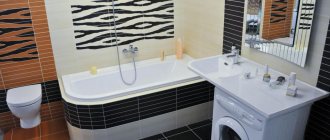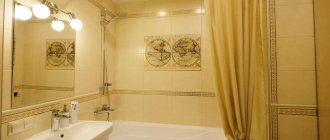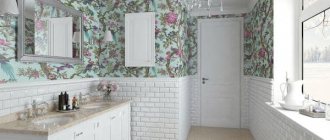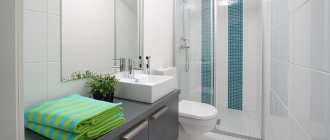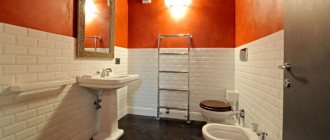The size of the bathroom in old and sometimes new apartments makes it difficult to accommodate all the necessary fixtures.
In many homes, the washing machine is in the kitchen, because there is simply not enough space in the bathroom. It can be difficult not only to fit a cabinet for accessories or a sink, but also to simply install a normal-sized bathtub.
Let's talk about whether it is possible to enlarge the bathroom at the expense of the kitchen, and what other ways there are to expand the space in the bathroom and toilet.
Features of bathroom redevelopment
Remodeling a bathroom is a change in the formation of the area of the bathroom and toilet. This could be expanding, reducing the size of the room, changing its shape, etc.
Redevelopment is carried out on legal grounds. Large-scale changes must be registered by competent organizations.
Redevelopment without permission from a government agency is prohibited. To combat unauthorized changes, a system of fines is provided. Complex issues are resolved through judicial practice.
When combining a bathroom and toilet is prohibited or undesirable
There are nuances in which remodeling the toilet and bathroom is considered undesirable, but not prohibited by law:
- Having a large number of people in the family. In the morning and evening, family members will line up to go to the toilet or shower. A separate room in this case will be more convenient.
- Combination of bathroom and kitchen. If you combine the restroom, this will lead to the accumulation of unpleasant odors that can penetrate into the kitchen even if there is high-quality ventilation. Using air fresheners will not correct the situation, as the kitchen will constantly smell of household chemicals.
- Radical elderly people in the family. Not all family members, accustomed to Soviet separate toilets, consider a combined bath and toilet a convenient and correct solution. In some cases, it is better to avoid quarreling and leave the bathtub and toilet separated.
Any redevelopment project must be discussed with all family members, otherwise it can lead to discord and constant conflicts.
Grounds for project approval
Expanding the bathroom at the expense of the kitchen is not approved in most cases. This is due to the fact that there is a ban on placing a bathroom or toilet above living spaces.
There are several exceptions when a project can be approved:
- Housing on the ground floor . In this case, your redevelopment does not cause damage to your neighbors in the event of an accident: burst pipes, breakdown of plumbing. To obtain a permit, contact the appropriate authority. The list of documents is selected individually. This is influenced by the type of partition, the scale of the planned work, the features of the house and other factors.
- The lower premises are rented out for commercial needs . If you live on the second floor and there is a cafe, store, or office below you, then the housing inspection will allow you to carry out the redevelopment. This will require documentary evidence that the ground floor is used for commercial purposes.
- The apartment below has a non-residential area . A suitable option is if a neighbor has remodeled and expanded the bathroom at the expense of the kitchen. In this case you can do similar work. At the same time, it is important that the neighbor carries out the redevelopment according to the law, coordinating all changes. If the work is completed without notifying the competent authorities, then no one will approve your project. It is also possible to increase the area of the bathroom at the expense of the kitchen if under the selected area there is a corridor, a study, a dressing room, a storage room, etc. These types of premises are classified as non-residential and expansion of the bathroom and toilet is allowed. To do this, you will need to present a plan of your neighbor’s apartment, confirming that there is no residential area under the future bathroom.
- If redevelopment is planned on the second level of a two-level apartment . If you own two apartments, located one below the other, then you can safely carry out redevelopment work. The project will be approved, since the owner himself is responsible for the consequences of such a decision.
From this list it is clear that it will not be possible to change the layout of the bathroom in most apartments . Such strict regulations are associated with the specifics of the work being carried out.
Enlarging the toilet at the expense of the kitchen violates regulatory requirements for the condition of living space and worsens the living conditions of the neighbors below.
Moving a bathtub or toilet to another location
Since the sink and bathtub require pipes with a diameter of 50 mm with a slope of 2 to 4 degrees, moving them does not cause significant problems (be it a panel or brick house). Proper installation of plumbing ensures the natural elimination of liquid waste.
Important! Laying a sewer system without a slope will cause water to stagnate. This leads to blockages and the constant presence of unpleasant odors.
Changing the position of the toilet is somewhat more difficult, since it needs a large diameter pipe - 10 cm. It is important to remember that it is also located at an angle. The transfer procedure is complicated by the presence of “elbows” (corners) in the pipe. It is important to remember hygiene standards: the toilet is always installed in pairs with a sink, or a sink with a bathtub (although this method is used less frequently).
Features of installing additional equipment
Such parts of the restroom as a heated towel rail, washing machine, drying cabinet are installed in accordance with certain requirements of logic and convenience.
So, the heated towel rail must be located next to the water communications, otherwise this will lead to a change in water circulation and a general decrease in its temperature. Of course, if an electric heated towel rail is installed, then this requirement may not be adhered to.
Advice! Choose dryer models without many thin parts and narrowings, otherwise water will not circulate well in them. In addition, over time, scale and other contaminants accumulate in narrow places, which will lead to a sharp narrowing of the duct.
It is best to opt for a dryer, the size of which is 60 by 80 cm. You can choose any type of electric heated towel rail - the main thing is not to overdo it with the size, otherwise it will be too hot in the restroom. Connecting a washing machine requires a cold water supply and sewerage, but these procedures do not require coordination.
Acceptable bathroom remodeling
The bathroom and toilet are classified as non-residential space. Therefore, they can only be expanded using the same type of area. Redevelopment at the expense of the kitchen is impossible, as well as reverse work. But how to make your home comfortable and expand your bathroom?
There are a number of legal changes you can make to your bathroom:
- Expansion through the corridor . If space allows, shorten the passage. The optimal width of the corridor at which you will feel comfortable is 90 centimeters. At the same time, take into account the interests of elderly family members and people with limited mobility, if any. In some cases, reducing the width of the corridor may be regarded as a deterioration in living conditions. In this case, the project may be rejected. Before carrying out work, it is necessary to coordinate the redevelopment with the BTI.
- Relocating a bathroom . By law, you can move the bathroom and toilet anywhere in the house as long as there is no living space underneath. Use the pantry, change the hallway if it is large and space allows, etc. However, no one will allow you to move the shower stall into the bedroom. This is only permissible if you live on the ground floor, there is a store or cafe below you, etc. When transferring communications, it is important not to disrupt circulation. In this case, the water pressure in adjacent apartments will decrease. This can also negatively affect the temperature of the hot water.
- Combining a bathroom . The procedure is legal. You can either combine the bathroom and toilet or separate it. To do this, you will need to coordinate the project with an authorized company.
When agreeing on redevelopment, waterproofing work must be carried out within the bathroom and toilet . Redevelopment requires the preparation of certain documentation. Sometimes it is necessary to develop a technical report on the condition of load-bearing structures.
If the floors are wooden or mixed, a stability assessment is carried out. The load is also calculated taking into account the new layout.
Conclusion
You can enlarge the kitchen using the bathroom area in two cases: when the apartment is located on the top floor, or if the neighbor above has a special apartment layout. In the second case, it will be possible to increase the kitchen area if after this the kitchen does not “crawl” under the bathroom of the neighbors above.
Free consultation
Promotion -20% for ordering redevelopment approval!
Cost of redevelopment services
| Service | Price | Duration (Working days) |
| Consultation | 0 rub. | — |
| Obtaining permission for redevelopment without affecting load-bearing structures | from 29,000 rub. | from 1.5 months |
| Obtaining permission involving load-bearing structures | from 39,000 rub. | from 2 months |
| Coordination of previously completed apartment redevelopment | from 49,000 rub. | from 3 months |
| Coordination of turnkey apartment redevelopment | from 59,000 rub. | from 2 months |
| Coordination of apartment redevelopment + making changes to the Unified State Register on a turnkey basis | from 69,000 rub. | from 2 months |
| Obtaining permits affecting load-bearing structures in panel houses | from 119,000 rub. | from 3 months |
Reviews
We ordered redevelopment projects with a very large number of nuances and changes. There was an opinion that it was not realistic to do all this, much less legal. Soplan employees did a high-quality job and, together, transferred our idea to paper. We were able to go through all the steps without any problems. We are very grateful and recommend your company to everyone.
Dolgov Pavel
It was necessary to legitimize the redevelopment of non-residential premises. They did everything well, taking into account all our quirks in the room. I ordered full support. There were two meetings on my territory, then they immediately prepared all the documentation. That's basically it. Thank you for making this process so easy.
Vedehina Olga
I called and placed an order for remodeling the apartment. We arrived, took measurements, and took into account the wishes. Two weeks later the courier delivered the completed documents. It's that simple. Thanks for the work.
Skryabin Evgeniy
We came here and did not regret it at any stage of the redevelopment of our apartment. I would like to note that the prices are affordable in comparison with some companies that I contacted; according to the description, the service is the same, but much more expensive. In general, this company took me for a price, and in the end I was satisfied with both the quality and timing of the work.
Where to go
Before carrying out work on the premises, the redevelopment project is coordinated with several institutions. In this case, the plan for the future bathroom is created by a planning specialist, or drawn by the owner himself.
To coordinate the work you will need to visit:
- Housing inspection;
- Ministry of Emergency Situations to assess the safety of the work being carried out;
- BTI;
- Sanitary and epidemiological station;
- Housing office.
Once the project has been reviewed and approved, work can begin. Upon completion, you need to agree on the final version with what is approved in the documentation. The assessment is carried out by the competent authorities.
Documents for redevelopment
To submit an application for redevelopment, you need to prepare the established list of documents. It may differ depending on the type of walls, the features of the house itself, as well as the specifics of the individual project.
For 2022, in order to remodel the bathroom and toilet, you need to prepare:
- Application for work on redevelopment of housing space. The volume and type of work carried out is recorded. The scale is taken into account - is it necessary to demolish partitions, load-bearing walls, etc.
- Technical passport for housing.
- Project of the future bathroom. Compiled by a competent employee of an authorized institution or created independently. It is important that the drawing meets accepted standards.
- A document confirming ownership of the property.
- Consent to carry out repair and redevelopment work. It is taken in writing from all homeowners, even those who do not temporarily or permanently live in the apartment.
- Written approval of the project from authorized organizations.
Documents must be current at the time of submission. If the data is not true, this will entail liability. In some cases, there are criminal penalties for falsification.
Reasons for refusals
There are a number of reasons why you may be denied work on remodeling a bathroom and toilet:
- violation of the rules for submitting an application for redevelopment;
- violations when drawing up a project for changing the bathroom and toilet;
- making changes that contradict regulatory requirements for the condition of housing space;
- falsification of data or inconsistencies in documents.
Unauthorized redevelopment can be legalized only in court or through an authorized organization. This will entail material costs and payment of fines.
Replacing a bath with a shower
Many apartment owners are perplexed by remodeling the bathroom without destroying or erecting walls - only by changing the position of the toilet, bathtub and shower. Moving plumbing fixtures indoors without construction is only possible in certain cases.
So, if devices are marked in the technical plan of the BTI, then changes in their position must be agreed upon in accordance with clause 1 of the Appendix to the Government Resolution (they may differ in different cities). To transfer them, a sketch is required.
Most often, BTI marks the position of the sink, shower, bathtub and toilet in the plan. If the owner of an apartment wants to remove the bathtub and install a shower stall, then he needs to contact the BTI and agree on the stages of changes. But moving a heated towel rail or installing a washing machine does not require such approval and is not noted in the BTI plans.
How to remodel a bathroom: step-by-step instructions
Since the question of whether it is possible to enlarge the bathroom at the expense of the kitchen is answered negatively in most cases, let’s consider the general scheme of actions when making changes to the layout of the bathroom:
- Get a technical passport for the apartment . Issued by the BTI. Can be ordered through the multifunction center. When registering, you will need to pay a state fee of 1000 rubles. The document contains a detailed housing plan. This shows the exact area of the apartment and the inventory price. Information about the general condition of the house is recorded: date of construction, condition, communications, plan for major repairs, etc.
- Order a redevelopment project or create it yourself . The drawing is ordered from any design organization. If the work is simple, for example, you want to combine a bathroom and a toilet, then the drawing can be done by hand. Please familiarize yourself with the features of such plans in advance. If you are planning to carry out more serious work, then contact an authorized organization for the project. This is especially true if the redevelopment affects load-bearing walls.
- Collect and submit documents . The review period is 45 days. After the reception, you will be given a document indicating that the documents have been accepted for consideration. Documents are accepted by multifunctional centers and local administrations. You can also submit an application remotely through the State Services portal. If all documents are completed correctly and there are no complaints about the project, you will be given consent to carry out the work. It is valid for a year. If you do not have time to complete the redevelopment within this period, you will need to repeat the procedure.
- Approve the final project . Development is carried out on site. If you contacted an authorized organization, an employee will assess the condition of the bathroom and draw up a technical report. The project is submitted for consideration by Rospotrebnadzor. The assessment period is 2-3 months.
- Implement redevelopment . The duration of the work depends on the competence of the construction team. On average, a simple redevelopment takes 3 months. If you plan to do it yourself, the time period will be longer. It is important that the final version corresponds to the project stated in the documents. If there are any discrepancies, revision or rework will be required.
- Draw up a new apartment plan . Ordered from BTI. Next, the right to own the property with individual redevelopment is issued. A specialist will evaluate the construction work. Make sure they comply with the approved plan. Based on the measurements, a new technical data sheet will be issued. Processing time is 1-2 months. The cost of the service is 2-3 thousand rubles. After registration, provide new data about the property to the Unified State Register of Real Estate.
Unauthorized redevelopment
It happens that people don’t know how to legitimize changes in the bathroom or simply don’t want to do it . There is a fine for unauthorized redevelopment. For individuals it ranges from 1 to 3 thousand rubles. The size depends on the scale of the changes. The quality of the redevelopment is taken into account - if you demolished a partition, that’s one thing, but if you removed a load-bearing wall, that’s another.
There are two ways to agree on an already completed project: through the court or through the Interdepartmental Commission. In any case, the premises will have to be returned to their original condition.
The court may decide to preserve the changes only if it is determined that they comply with regulatory requirements for the condition of the living space and do not worsen the living conditions of neighbors.
How to coordinate such changes
To approve unauthorized changes, follow these steps:
- Assess the scale of changes: take measurements, identify inconsistencies.
- Collect documents for the apartment, which record the original plan of the living space.
- Invite a specialist. This is required if there are serious discrepancies with the plan. He will conduct a technical examination and assess the scale of the redevelopment.
- Contact the design organization. The necessary documentation will be drawn up there. They will create a project taking into account current changes.
- Order an examination to determine the adequacy of the transformations.
- Contact the housing inspection to approve a new project. If refused, go to court. You can appeal the decision within 3 months after it is made.
If the decision is positive, you will need to issue a new cadastral passport and provide data to the Unified State Register of Real Estate.
How not to buy an apartment with unauthorized redevelopment
There is a risk of buying an apartment with unauthorized redevelopment . Often, owners demolish partitions, combine bathrooms, and expand the area of the bathroom. However, changes are not recorded in official documents.
To avoid a fine, you need to determine whether redevelopment has been carried out. To do this, study the technical plan of the apartments of this building or the selected type of housing. You can also contact the BTI for a plan for a specific property.
In order not to doubt the seller and the apartment, you should check the following documents:
- certificate for the apartment;
- title deed;
- extract from the Unified State Register of Real Estate;
- passport for the property
Take your time when completing the transaction . Carefully check everything, from the seller to the history of the apartment itself. Don't go for cheap. An apartment with a clearly undervalued price should first of all arouse not delight, but suspicion.
Fraudsters often put such properties up for sale in order to quickly attract buyers. Read all the documents and visually evaluate the home. Traces of redevelopment can be visible to the naked eye.
Installation of waterproofing, floor and exit
After each redevelopment, it is important to take into account the arrangement of floors in the sanitary unit. The first thing to do is to think about waterproofing, especially when increasing the area. First, the apartment owner dismantles the old floors and then waterproofs them in accordance with the law.
Important! Installation of new waterproofing requires the execution of an act for hidden work - it is signed by a specialist in architectural supervision and the builder, or by an employee of the management company in case of independent repairs.
Waterproofing can be rolled or coated. The second option is most often used, since it is simpler and does not carry a significant load on the floors. Roll insulation requires leveling the floors with a screed.
Coating insulation is considered more airtight and reliable, not requiring a layer of screed. The floor level in the restroom should be 15-20 mm below the level of the finished floor in adjacent rooms. Also in SNiP there is a requirement to install a dividing threshold.
As for creating an exit from the restroom to the bedroom, this also has its own requirements. Thus, SanPiN prohibits equipping a room with a toilet and shower or bathtub with access to the living room. In this case, you can enter from the bedroom if there is an additional room with a toilet and sink, the entrance to which is equipped from the corridor.
Thus, if there is only one restroom with a toilet in the apartment, the entrance to it cannot be through the bedroom or kitchen. If there are two rooms, then one of them can go into the living room or kitchen.
Redevelopment involving mines
Ventilation and sewerage are equipped in strict accordance with the law, so changing them requires permission. This space can be used only after collecting the signatures of the homeowners. Many experts advise not to touch these spaces that are not the property of the apartment owner, since the labor costs will be inconsistent with the benefits received.
Let's sum it up
Redevelopment requires approval . In most cases, you can increase the area of the bathroom only through a corridor or storage room.
However, under certain circumstances, it is possible to expand the bathroom at the expense of the kitchen. In this case, you will need to document your right to change the layout.
All changes can be approved by authorized organizations upon presentation of the corresponding list of documents. There is a fine for unauthorized redevelopment.
Combination of toilet and bathroom
The most popular way to remodel a bathroom is to combine it with a bathroom. By increasing the space, the apartment owner can add new furniture and other items to the restroom.
Important! The partition between sanitary departments is easy to demolish and in 99% of cases is not load-bearing. Therefore, the procedure for its demolition is considered simple and does not require significant permits and a long study of the sketch in the BTI.
By removing the partition, the owner has the opportunity to comfortably place a washing machine, large bathtub or shower in the restroom. Here are the benefits this procedure provides:
- eliminating the doorway of one of the rooms significantly expands the layout options of the bathroom - items are placed more conveniently;
- In many homes, bathroom communications take up a large space and are extremely inconvenient to use. Redevelopment allows you to get rid of this discomfort;
- You can save on wall cladding and installing an additional door.
If the redevelopment makes it possible to install a door that opens outward, then this saves even more space and increases the functionality of the room.
Features of layout in houses of different types
In Khrushchev-era buildings, the partition in the restroom is never load-bearing, so removing it does not pose a danger to neighbors below or above. In panel houses the situation is somewhat different.
In some buildings, the partition in the restroom performs a load-bearing function, so even at the planning stage it is necessary to make sure, using the technical passport, that it is possible to remove the wall between the toilet and the bathroom.
Remodeling a bathroom can also be complicated by the fact that in a panel house the partition consists of reinforced concrete. It is much more difficult to break than a brick wall. For dismantling, you will need an angle grinder, supports and extreme care - without following the technology for breaking the wall, there is a high risk of its collapse.
Features of bathroom separation
You can separate the toilet, shower and bathtub in different ways. The most drastic of them is the construction of a brick wall. To do this, you need to take into account the following requirements:
- create a design and approve it in BTI;
- study the position of water pipes and move them if necessary, and also change the position of plumbing fixtures and meters;
- You will need to install an additional doorway for a toilet or bathroom.
Instead of a brick wall, you can use modern methods of dividing space: installing a glass panel or decorative wall, using a folding screen, or arranging pieces of furniture to harmoniously divide the space.
All these methods are considered to be quite functional and do not require major intervention in communications. The construction of an additional brick wall can also be complicated by the fact that it carries a significant load on the floors.


